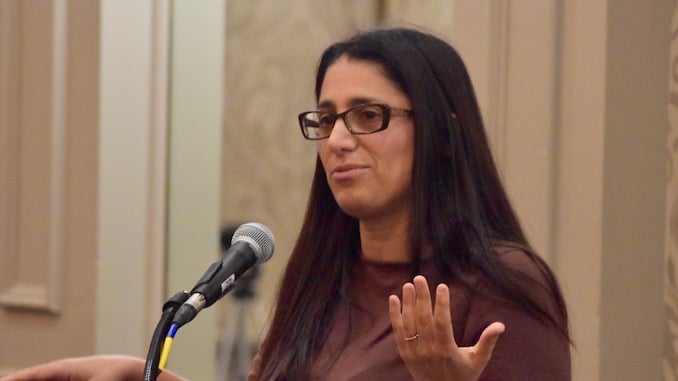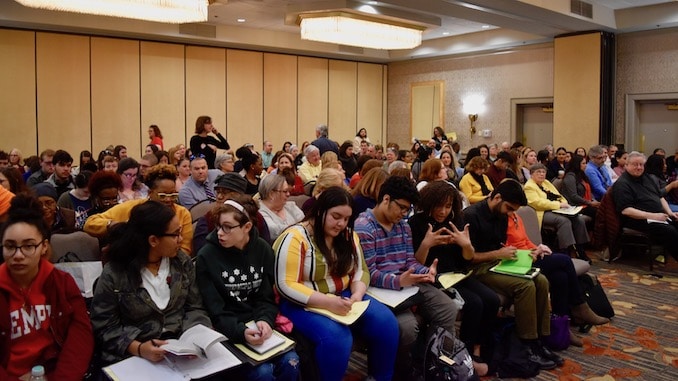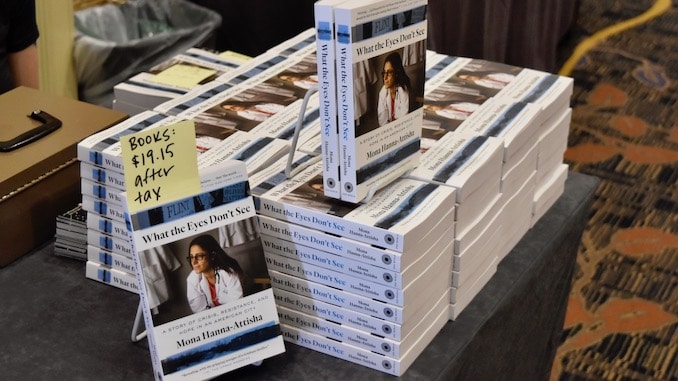Dr Mona Hanna-Attisha scientist-hero of the Flint water crisis, comes to Rhode Island
The Rhode Island Department of Health (RIDOH) and Rhode Island Department of Environmental Management (RIDEM) hosted Dr Mona Hanna-Attisha, a pediatrician, professor, public health advocate and author of What the Eyes Don’t See: A Story of Crisis, Resistance and Hope in an American City – a first-hand account of the Flint water crisis at a large public event on Thursday.
April 12, 2019, 10:31 am
By Steve Ahlquist
The Rhode Island Department of Health (RIDOH) and Rhode Island Department of Environmental Management (RIDEM) hosted Dr Mona Hanna-Attisha, a pediatrician, professor, public health advocate and author of What the Eyes Don’t See: A Story of Crisis, Resistance and Hope in an American City – a first-hand account of the Flint water crisis at a large public event on Thursday. Hanna-Attisha’s book was selected by Reading Across Rhode Island for this year’s One Book, One State community reading program.
Hanna-Attisha is a pediatrician working in Flint, Michigan. After government officials switched the source of the City’s water from the Great Lakes to the Flint River, Hanna-Attisha noted an increase in children’s lead levels. No amount of lead is safe for children, but Hanna-Attisha and her team soon found that the water was overflowing with lead.

Hanna-Attisha went public with her research before her research was peer-reviewed because the public health implications were so great, and peer-review takes precious time. Initially the government denied her findings. But very quickly the government backed Hanna-Attisha’s research, and within a month the source of the water was switched back.
Now Hanna-Attisha leads efforts to improve the health outcomes of children in Flint. Her work and her advocacy will literally change the lives of tens of thousands of children.
The talk was attended by about 200 people, and there was a waiting list for available seats. Hanna-Attisha spoke for about 30 minutes and took many questions from the audience.

“For far too long we have been using children as detectors of environmental contamination,” said Hanna-Attisha. “When I found out about the possibility of lead in water, I freaked out. I freaked out because I know that it is a form of environmental injustice, environmental racism.”
“You just have to open your eyes a little to realize that we are not a nation that protects children,” said Hanna-Attisha. “Our policies have not been endearing to our kids. Why?”
“The attacks on my science, they continue,” said Hanna-Attisha. “We are very much in this climate right now of science denial – whether it’s climate change or vaccines – even now we see a resurgence of lead deniers, driven by the lead industry and their lawyers who are trying to downplay what happened in Flint…”
In response to the controversy in Flint, the very first act of the new Governor of Michigan was to sign an executive order telling state employees to “feel free to raise concerns,” said Hanna-Attisha. “It was almost like whistle-blower protection. If you have any worries or concerns that endangers the health of Michigan, feel free to raise that concern.”
We need that in Rhode Island for sure.
Here’s Dr Mona Hanna-Attisha’s full talk:
Calling Hanna-Attisha’s work and her book “truly inspiring, Dr Nicole Alexander-Scott, director of RIDOH, said, “This is the heart of public health in action. It’s about evidence; using science and data to drive our work. It’s about prevention; putting systems in place to catch children and families and communities before they fall. It’s about equity; removing obstacles to health for every child in every community regardless of their zip code. It’s about social justice; acknowledging and acting on forces like discrimination, that created the conditions that we live in today, where some people get to live in safe homes and neighborhoods, and others don’t…”
Terence Gray, deputy director for environmental protection at RIDEM also spoke briefly to introduce Hanna-Attisha.
Here is the full question and answer portion of the talk:
Laura Brion is the executive director of the Childhood Lead Action Project in Rhode Island:

UpriseRI is entirely supported by donations and advertising. Every little bit helps:
Become a Patron!






